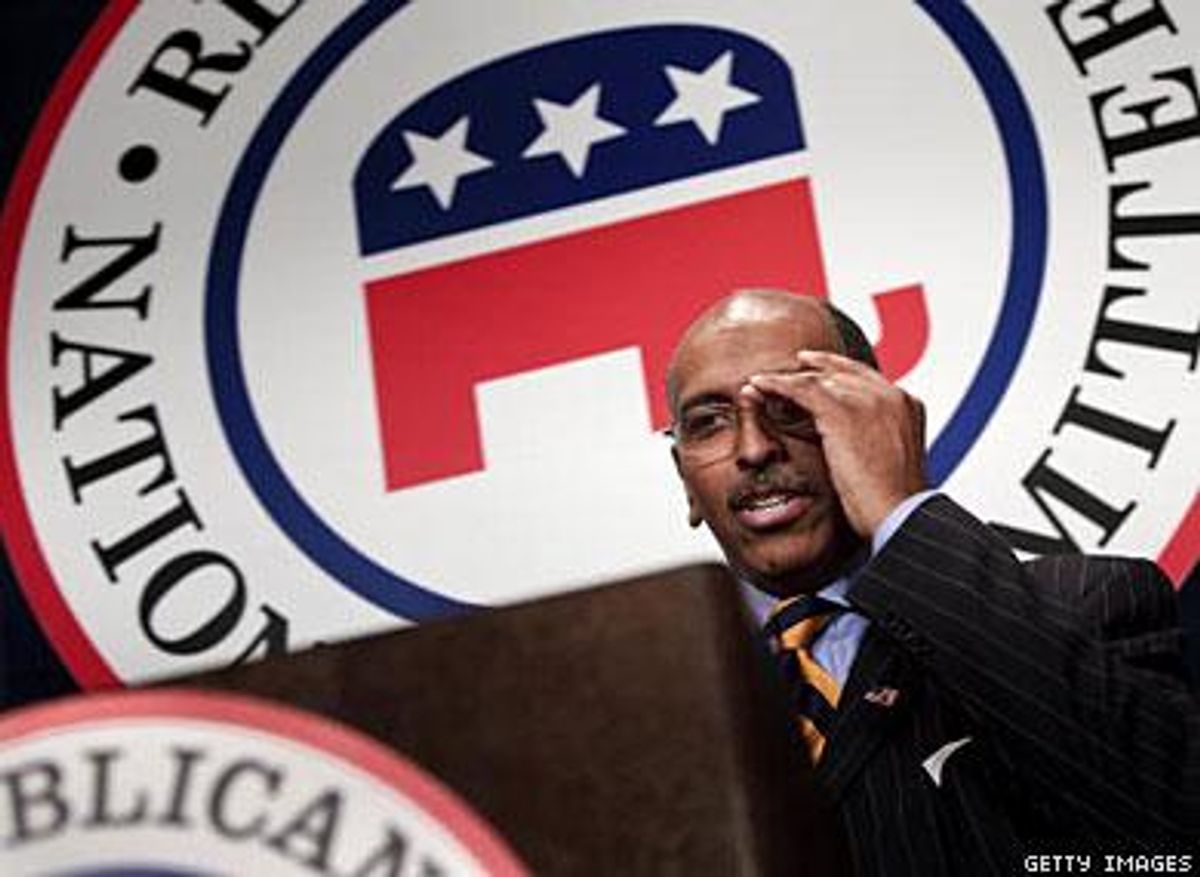
New GOP chairman Michael Steele was supposed to be a breath of fresh air, especially on gay issues. Instead, he's been a disappointment.
March 10 2009 12:00 AM EST
November 17 2015 5:28 AM EST
By continuing to use our site, you agree to our Private Policy and Terms of Use.

New GOP chairman Michael Steele was supposed to be a breath of fresh air, especially on gay issues. Instead, he's been a disappointment.
Michael Steele, the new chairman of the Republican National Committee, was supposed to be a breath of fresh air for the moribund Grand Old Party. Not only has the first African-American leader of the GOP put a more diverse face on an organization that consists largely of older white men, but more substantively, his moderate conservatism was promised to be the saving grace of a party in desperate need of reform. Steele had been a member of the Republican Liberty Council, a group of socially moderate Republicans founded by former New Jersey governor Christine Todd Whitman that tried to make pro-choice and pro-gay politicos feel more comfortable in the party. Steele was also unafraid to criticize the excesses of the GOP; when he ran for Maryland senator in 2006 he joked that the "R" in Republican was akin to a "scarlet letter."
In his campaign to become party chair, Steele ran as a moderate. Not long after he won a contentious leadership election that necessitated six ballots, Steele acknowledged that his ascension presented an "important opportunity" to reach out to pro-choice and pro-gay voters. But since taking the helm of the RNC in January, Steele has proven himself thus far to be a disappointment to those hoping that he would move the party towards the center, especially on issues of concern to gay voters.
First, there was Steele's well-publicized row with conservative talk radio king Rush Limbaugh. Attempting to neutralize a coordinated Democratic strategy of painting Limbaugh as the leader of the Republican Party, Steele referred to Limbaugh as occasionally "incendiary" and "ugly" in an interview with CNN's D.L. Hughley. It didn't matter that this remark was made in passing, or, for that matter, that it was true (even Limbaugh's army of unreflective "dittoheads" cannot deny it). The increasingly shrinking conservative movement will brook no criticism of its loudmouth standard-bearer, and essentially proved the Democratic analysis correct by rushing to Limbaugh's defense and pressuring Steele to prostrate himself at the host's feet, which he did posthaste.
But a more dispiriting example of Steele's captivity to outdated social conservative ideology was a little-noticed remark he made in an exchange with another right-wing talk radio host, Mike Gallagher, about a week before his spat with Limbaugh. Asked by Gallagher if he favored civil unions for gay couples, Steele responded :
"No, no no. What would we do that for? What are you, crazy? No. Why would we backslide on a core, founding value of this country. I mean, this isn't something that you just kind of like, 'Oh, well, today I feel, you know, loosey-goosey on marriage.' I mean, this is a foundational principle of this country. It is a foundational principle of organized society. It isn't something that, you know, in America we decided, 'Let's make it between a man and a woman; oh, well, now let's change our mind and make it between anyone and anyone.'"
No.
Never mind the callous way in which he treated the issue -- certainly, the mere question of whether or not committed gay couples should continue to be legally discriminated against deserves a more measured response than an inquiry into whether the person posing it should have his head examined -- Steele's reply was firmly out of step with the American electorate. A succession of recently conducted polls have found that over 60% of Americans support either civil unions or full marriage rights for gay couples. (Even George W. Bush, who led the effort to pass the Federal Marriage Amendment in 2004, came out in support of civil unions in 2004 and expressed disagreement with the GOP platform.) Most analysts of social trends agree that this figure will increase significantly over time as older Americans with more conservative views on homosexuality die, while younger and more tolerant Americans begin voting in higher proportions, and general attitudes on homosexuality liberalize across the board.
So it is not the conservatives urging their movement to moderate itself on the defining civil rights issue of the day who are "crazy." Put aside the debate about the desirability of gay marriage; antigay politics will soon become anachronistic and a surefire electoral loser. Some, like the reform-minded former Bush speechwriter David Frum, have realized this fact and called for a softer approach to social issues, particularly gay marriage (full disclosure: I'm a contributor to Frum's website, NewMajority.com ). But those conservatives willing to question their party's position on gay rights have been viciously attacked, and there's little indication that their views are influencing a critical mass of the Republican Party leadership.
Last November, according to exit polling, 27% of self-identified gay voters chose McCain over Obama (the actual number of gays who voted GOP was probably far higher, given that many presumably did not out themselves to pollsters). In a dismal year for Republicans, gays were the only group whose support for the Republican nominee rose from its 2004 level. There was good reason for this increase considering the fact that McCain courageously opposed the FMA, was the first Republican presidential nominee to grant an interview with a gay news outlet, and seemed more amenable than his predecessors on other gay issues. Yet in exchange for this support, gays now see a Republican Party chairman who, while promising a bigger tent, has just shrunk it. The decline of the GOP as a national party continues apace.
Viral post saying Republicans 'have two daddies now' has MAGA hot and bothered